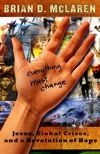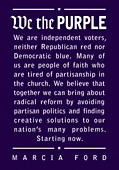Greetings to new readers of BookNotes visiting from the recent Everything Must Change/DeepShift event with Brian McLaren in DC. We have been grateful to be the EMC tour official bookstore as we’ve shipped stuff all of the land, offering Brian’s books and other resources for those who are exploring the most urgent issues of our time at the series of DeepShift conferences. As I’ve said here before, Everything Must Change: Jesus, Global Crisis and a Revolution of Hope (published by Nelson; $21.99) is a notable and important shift for Brian as he spends less time making a case for being a “new kind of Christian” or finding ourselves seeking a “church on the other side” —the whole postmodern, emergent conversation—but rather, inviting imagination and hope and action in light of the pressing global concerns of sustainability, climate change, poverty and war. From mountain-top removal in Appalachia to the ways in which South Africa found new vision while overthrowing the old apartheid era, from churches that reach out to the homeless poor to the crisis of international security, war and nationalism, we grappled with big, big concerns in a spirit of collegiality and, more importantly, spirituality.
McLaren in DC. We have been grateful to be the EMC tour official bookstore as we’ve shipped stuff all of the land, offering Brian’s books and other resources for those who are exploring the most urgent issues of our time at the series of DeepShift conferences. As I’ve said here before, Everything Must Change: Jesus, Global Crisis and a Revolution of Hope (published by Nelson; $21.99) is a notable and important shift for Brian as he spends less time making a case for being a “new kind of Christian” or finding ourselves seeking a “church on the other side” —the whole postmodern, emergent conversation—but rather, inviting imagination and hope and action in light of the pressing global concerns of sustainability, climate change, poverty and war. From mountain-top removal in Appalachia to the ways in which South Africa found new vision while overthrowing the old apartheid era, from churches that reach out to the homeless poor to the crisis of international security, war and nationalism, we grappled with big, big concerns in a spirit of collegiality and, more importantly, spirituality.
Those that know us here at the bookstore know that we have long carried the best Christian (and some Jewish and secular) resources on global issues, as wholistic mission and faith-based social action has always been a feature of our shop. It is no accident that alongside our fairly traditional (some say conservative) historic Biblical theology and classic spiritual formation books we have long carried books by William Stringfellow and Ron Sider, by Phil Berrigan and Rachael Carson, John Stott and Rene Padilla, John Perkins and Dorothy Soelle, Martin Luther King and Marva Dawn, Jonathan Kozol and Tom Sine, John Howard Yoder and Dorothy Day, Richard Mouw and Thomas Merton, just to name a few. Brian is not the first to say that the framing stories that shape our worldviews, and consequently our ways of living in the world—-caring or not caring about the burning issues of the day—are the most important thing to get right. (I still say that Brian Walsh & Richard Middleton’s worldview masterpiece, Transforming Vision is one of the most important books in our shop; McLaren, happily, draws upon Walsh & Keesmaat’s Colossians Remixed to show the kinds of transformational Biblical study that can guide us into this kind of radically Biblical change.) Indeed, we often call ourselves radical Christians, not to suggest revolutionary fever or lefty politics; not at all, really. Radix is the Latin root word from which “radical” derives and it means “root.” We need to get at the root causes, the deepest ideologies which shape the current ways of understanding and being in the world. (The emergent gang is mostly right about this, that the Christian faith ought not be uncritically wedded to a modernist worldview, and that radical rethinking is needed to disentangle centuries of cultural capitulation to the spirits of the Enlightenment et al. I suspect it was Francis Schaeffer that first taught me that.) As McLaren suggests in Everything Must Change, we must “wake up” to new dreams of what God is doing in the world, and think considerably differently, “singing a new song” into the new world God is ushering into history. We call that—as he explicates nicely in The Secret Message of Jesus–the Kingdom of God. And so, we just came back from a nice witness to the Kingdom, an experience of the Kingdom, a gathering of various ages, diverse denominations, conflicting theologies and different preferences for worship and liturgical styles, even, I’d imagine, different impulses around politics and public policy proposals. Praise be to God, Nazarenes and Episcopalians, Methodists and PCA Presbyterians, Baptists and Lutherans (though not many historic black churches represented, or Catholics, it seemed) joined together to reflect on the deepest issues of our cultural crisis and what King Jesus might want us to do. It was a precious time, a joyful time, if a difficult time of selling books (yes, amidst illness, again.) Many, many thanks to our stalwart volunteers from Vienna Pres and the CCO, especially.
The tour moves on to other cities over the next month or so. Check out the DeepShift schedule and make plans to be a part of a very exciting, well planned, and multi-faceted experience of song, art, lecture, conversation, silence, worship, meals and book-buying. Yes, indeedie: buying books is part of the way to wake up to a new world. We’ve got a lot of ideas to consider, plans to make, lives to change (starting, of course, with our own.) Books are allies in the journey, food for the day, insight for new living. Thanks for your support of our store, for you interest in good books. Buying books from us, here, enables us to stay afloat long enough to continue serving these kinds of conferences and folks on deep in the trenches of important work. We are glad to be able to serve them, and you help make it possible. We are grateful for your ongoing support.
The biggest selling books (other than McLaren’s) at the EMC DeepShift event? Clearly Claiborne’s Jesus for President (the amazing graphic designers of the book, Ryan and Holly Sharp, were there, doing music as the Cobalt Season and it was terrific to meet them.) Many took up my recommendation of the serious-minded and richly provocative Hope in Troubled Times by Mark Vander Vennen, Bob Goudzwaard & David Van Heemst. I promoted Os Guinness’ The Case for Civility, and it seemed useful to many. A handful of people bought Scot McKnight’s Community of Atonement, a balanced and wise bit of refreshing theological thinking, which made me glad. A few people got John Caputo’s What Would Jesus Deconstruct?, which I found a bit troubling, although I loved Jamie Smith’s earlier book in the series, Whose Afraid of Postmodernism: Taking Derrida, Lyotard & Foucoult to Church, so sold that to ’em too.
 A book that arrived today that I really wished I could have taken there: We the Purple by Marcia Ford (Tyndale; $17.99.) I am not sure I am purple, exactly–a blend of red and blue, obviously, and I sometimes think I’m a completely different color—but it does capture something, doesn’t it? The cover itself looks like a manifesto. It makes the case, obviously, for independent voters, stating on the cover that it is about people of faith “who are tired of partisanship in the church. We believe that together we can bring about radical reform by avoiding partisan politics and finding creative solutions to our nation’s many problems.” There are tons of stories, lots of interviews, profiles and testimonials of grassroots, truly third way folk. Looks good.
A book that arrived today that I really wished I could have taken there: We the Purple by Marcia Ford (Tyndale; $17.99.) I am not sure I am purple, exactly–a blend of red and blue, obviously, and I sometimes think I’m a completely different color—but it does capture something, doesn’t it? The cover itself looks like a manifesto. It makes the case, obviously, for independent voters, stating on the cover that it is about people of faith “who are tired of partisanship in the church. We believe that together we can bring about radical reform by avoiding partisan politics and finding creative solutions to our nation’s many problems.” There are tons of stories, lots of interviews, profiles and testimonials of grassroots, truly third way folk. Looks good.
With similar concerns, although not quite the same strategy, my dear, dear friend, Steve Garber did a very important piece last summer for Comment, on not being cynical about “proximate justice.“ Alas, a good handful of folk, mostly younger, responded to his article in the latest issue, a symposium of responses. I commend that to you. If we are going to rock the worldviews, and rock the vote (or, as Shane puts it, vote the Rock) we will have to continue to think about all of this stuff. Get McLaren’s book if you haven’t yet, start a small group around some of the political ones I reviewed last month at the website column, or check out this new independent voice—Ford is a fun writer, we know that from her lovely, poignant, Memoir of a Misfit. It isn’t exactly the feisty brilliance of the smalltown anarchist Bill Kauffman (Look Homeward America) or the “crunchy con” of hippy conservatives like Ron Dreher, but it is a new voice, outside the bi-polar predictabilities of the religious right or the faith-based left. As Becky Garrison (of The Wittenburg Door) puts it, “Marcia Ford employs sass, spirituality, and statistics to expose the failings of our current two-party system”¦” Key Life preacher Steve Brown even says, “”¦Ford almost convinced me to give up my partisan political positions and join her.” Maybe it is not quite radix enough, but it sure does make us think. And laugh, which, as Brian reminded us at EMC, is a deep Christian virtue.

With a title like Jesus for President, I’m not surprised it’s selling well.
Ha! I’m one of the people you sold both “What Would Jesus Desconstruct” and “Who’s Afraid of Pomo” to. What were your concerns? Still haven’t read them…finishing up the EMC book.